Worksheet: Voilà le frère et la sœur de Manuel | French for Class 6 PDF Download
Complétez les phrases (Fill in the blanks)
(a) Je _______ (manger) une pomme
(b) Nous _______ (aller) au cinéma ce weekend.
(c) Ils _______ (prendre) le bus pour l'école.
(d) Tu _______ (avoir) un chat et un chien.
(e) Elle _______ (être) ma meilleure amie.
Comment le prononce-t-on? (What is the pronunciation?) Write the phonetic pronunciation
(a) Le pied
(b) La tête
(c) Les yeux
(d) La bouche
(e) L'épaule
Associez les suivants (Match the following)

Vrai ou Faux? (True or False)
(a) "Le nez" est pour sentir. (The nose is for smelling.)
(b) "Les genoux" peuvent être utilisés pour entendre. (The knees can be used to hear.)
(c) "La jambe" est une partie du bras. (The leg is a part of the arm.)
(d) "Le poignet" est proche de la main. (The wrist is close to the hand.)
(e) "Les cheveux" couvrent le corps. (The hair covers the body.)
Trouvez la paire (Find the pair)
(a) écouter | 1. regarder(b) aimer | 2. Parler
(c) marcher | 3. écrire
(d) chanter | 4. Lire
(e) étudier | 5. entendre
Choisissez la bonne préposition (Choose the correct preposition)
(a) Je suis _______ la bibliothèque. (à / dans)(b) Il est allé _______ France l'année dernière. (en / au)
(c) Nous jouons _______ le parc. (au / dans)
(d) Elle vit _______ une grande ville. (à / en)
(e) Le livre est _______ la table. (sur / sous)
You can access the solutions to this worksheet here.
|
17 videos|44 docs
|
FAQs on Worksheet: Voilà le frère et la sœur de Manuel - French for Class 6
| 1. What are some key vocabulary words related to the family in French? |  |
| 2. How do you pronounce the French words for brother and sister? |  |
| 3. What prepositions are commonly used with family terms in French? |  |
| 4. Is it true that in French, the adjective usually comes after the noun? |  |
| 5. What is the importance of learning family vocabulary in French? |  |
















